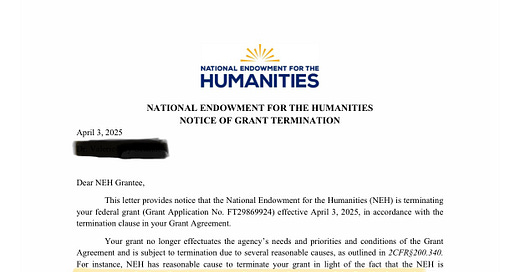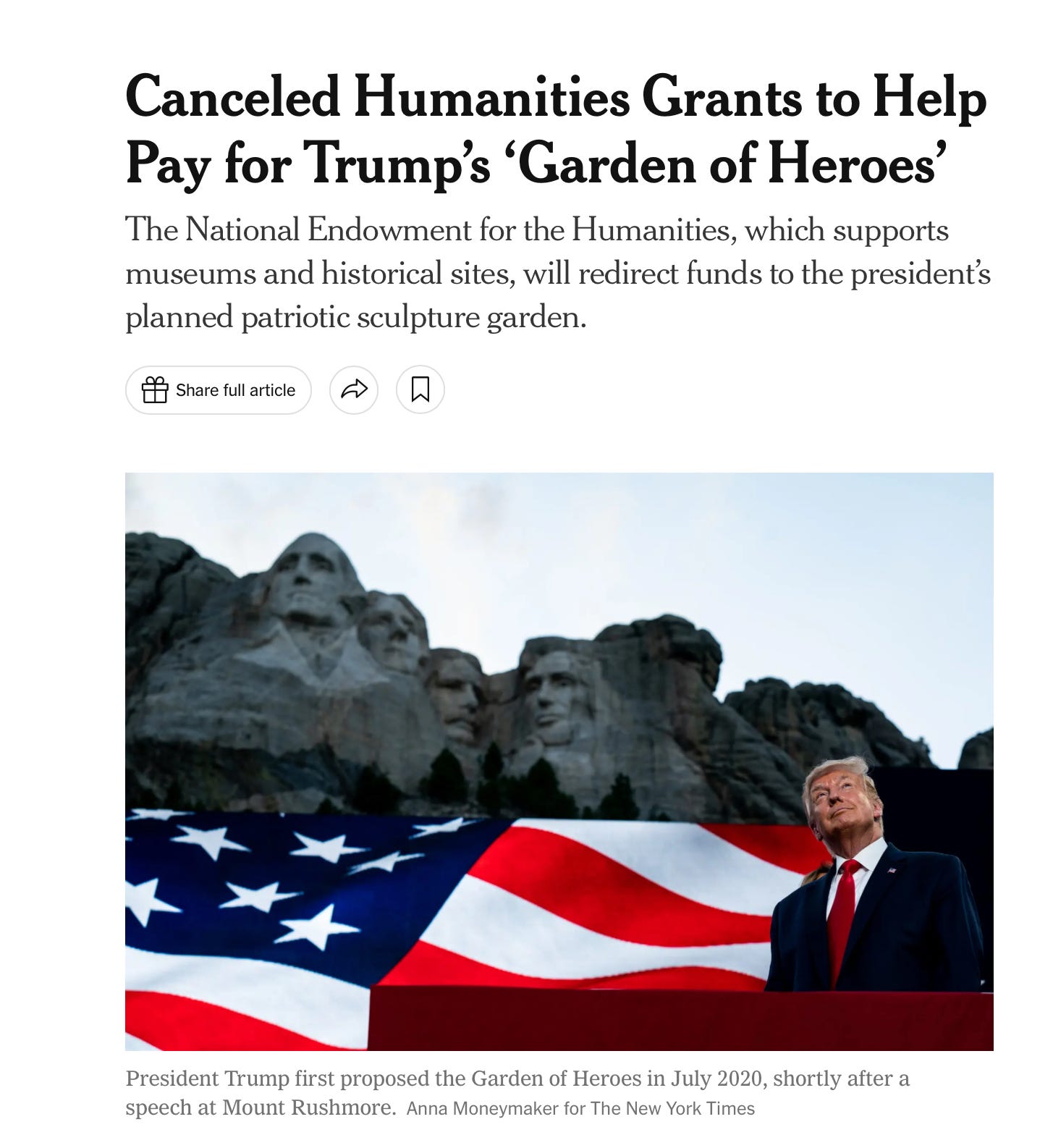Last week, the National Endowment for the Humanities sent out letters to its grant recipients, notifying them that their funding - already approved by specially appointed committees, on a competitive basis - was being terminated. Grant recipients included individual scholars working in various fields of the humanities, as well as institutions such as museums and other organizations devoted to cultural and historical preservation and programming. Notably, according to the Detroit Free Press, humanities councils across all 50 states have had their grants terminated.
If you’re reading this newsletter, I know you know what is at stake here. This isn’t just a question of closing museums. It’s a direct attack on the preservation of culture and history. It is also an attack on the making of knowledge.
The termination of these NEH grants doesn’t only affect education, research, and cultural preservation. As the Detroit Free Press reported on April 8, various social programs across the US will also suffer.
“The cuts affect a broad range of programs and services, including state-specific efforts to reduce Alaska’s adolescent suicide rate and help Alabama educators teach civil rights history, as well as nationwide projects to digitize small-town newspapers and bring Smithsonian exhibits to rural and remote communities.” (Detroit Free Press, April 8, 2025)
NEH has terminated over 1,200 grants. Doge has indicated that it intends to cull the staff of the NEH, currently about 180 people, by 70-80%.
This past year, in the fall of 2024, I was asked to participate as a reviewer for the NEH Public Humanities Program. It was an honor to be asked. Reviewers read applications, meet in committee, and award grants to selected proposals. Many of these proposals take months, if not years, to develop. Given how competitive NEH grants are, most proposals are excellent - and yet, most projects are not funded. An NEH grant is a real prize. And certain projects would never see the light without one.
Unfortunately, I was unable to participate as a reviewer for the 2024 NEH Public Humanities Program because of other obligations. At the time, I told the program director that I would happily review proposals in the fall of 2025.
One must presume, however, that this year, the Public Humanities Program will not go forward in quite the same way, if at all. If NEH asks me to review proposals this year, I will have to weigh the ethical implications of doing so.
A friend of mine forwarded me one of the NEH termination letters and has given me permission to share. I have highlighted the phrases that are particularly troubling to me. There is nothing in the language that is specific to my colleague’s project, nothing to explain why this particular grant is being terminated. My guess is that everyone whose grant was pulled received the exact same letter.
The language is vague, and the actors are obscure. Notably, the NEH website provides no bio for Acting Chairman Michael McDonald, the man who signed these letters. I believe McDonald was previously general counsel for the organization, but I had to go looking for that bit of information. There is zero transparency in this entire process.
Why the cuts? Not to save money, despite all the promises of DOGE and this regime. Instead, there are other plans for the funds. As the letter above notes, the “NEH is repurposing its funding allocations in a new direction in furtherance of the President’s agenda.”
That agenda includes a reimagining of American history and art as the President deems fit - a reimagining of history as this regime wants it to be.
As the New York Times reported just yesterday, the President plans to use at least some of the funds to create a new “Garden of Heroes,” likely at the base of Mount Rushmore.
So, just to be clear, this isn’t about saving money. It’s about rewriting American history.
The current regime wouldn’t engage in this reshaping of history and culture if it didn’t think this rewriting was important. Erasing history and elevating one cultural narrative at the expense of another is straight out of the authoritarian playbook. We must object. We must explain to others that this is happening and why it is happening. Even simply making other people aware of what is going on is helpful. We must share what we know.
And sharing works. Outcry works. After the National Park Service recently erased several prominent references to Harriet Tubman on its webpage about the Underground Railroad — the backlash was so great that the NPS restored much of the original content.
As civil war historian Kevin M. Levin has pointed out here, the issue isn’t that the government is editing webpages — the National Park Service and other agencies are supposed to update information as necessary. The issue is what is being edited and the effect these erasures have on the telling of our national narrative. Levin also notes that while the content on Tubman was restored, other webpages on notable historical figures were not.
Make no mistake: this regime is trying to change the story that Americans tell ourselves about the past, to prevent schoolchildren and adults from learning even the most well-documented history. They know that history lessons aren’t simply found in textbooks. History lessons are all around us, every day. That is why they are changing the websites.
And their goal is not only to suppress history, but to control what will be considered knowledge in the future. With the termination of NEH grants, the government is trying to prevent scholars and institutions from making the knowledge — researching and disclosing stories and histories, the truths that have yet to be told — in the first place.
Along with the crackdown on US universities, this is a curtailing of academic freedom, an attempt to staunch the free flow of ideas. There is always room for a conversation about the value of certain ideas. That conversation — robust, passionate, engaged — is at the heart of the very concept of academic freedom. But what we are seeing now is not a conversation. It is a weaponizing of government funds to suppress ideas — no doubt because this government is afraid of those ideas.
I am not a historian of American history (yet). But I am an American and a historian. I know the political stakes embedded in historical work.
To me, this is also personal. As an American, my access to our history — my history — is being assaulted. If you are an American, this is your history, too. It belongs to you. And it is being assaulted.
We must fight for our history and for the cultural institutions that preserve and educate the public about who we truly are as Americans. We must fight for the right to grapple with the hardest parts of American history, because that is how we strive toward a more perfect union. We are hardly perfect yet; likely, we will never be. But I have always believed that the point was to keep striving. And we have worked too hard and struggled for too long to move closer to that “perfect union” to lose generations of progress now.
***Update: a reader of this newsletter has forwarded me a website that provides information on steps you can take — including legal action — if your grant has been terminated: https://t.congressweb.com/w/?HTJQJDELSN
This is yet another example of why I am grateful for the generous community here on Substack. Please continue to share what you know. And thanks for reading. ***







This is a dreadful situation and thank you for highlighting it. Having worked in academia in Ireland I know how vital government funding is to support new research, and how competitive it is. The language used in the letter smacks of a totalitarian agenda terrified of intellectual development and freedom, especially those executive orders being used in some crazy way to justify these decisions.
Some of these issues are being reported internationally, especially the raft of executive orders. But the nature of some of them appears to be insidious and obviously they have been working on them in the background for a while. The tariffs issue is now taking precedence as it will effect so many lives, across so manyl countries. Let's hope that common sense will emerge and prevail.